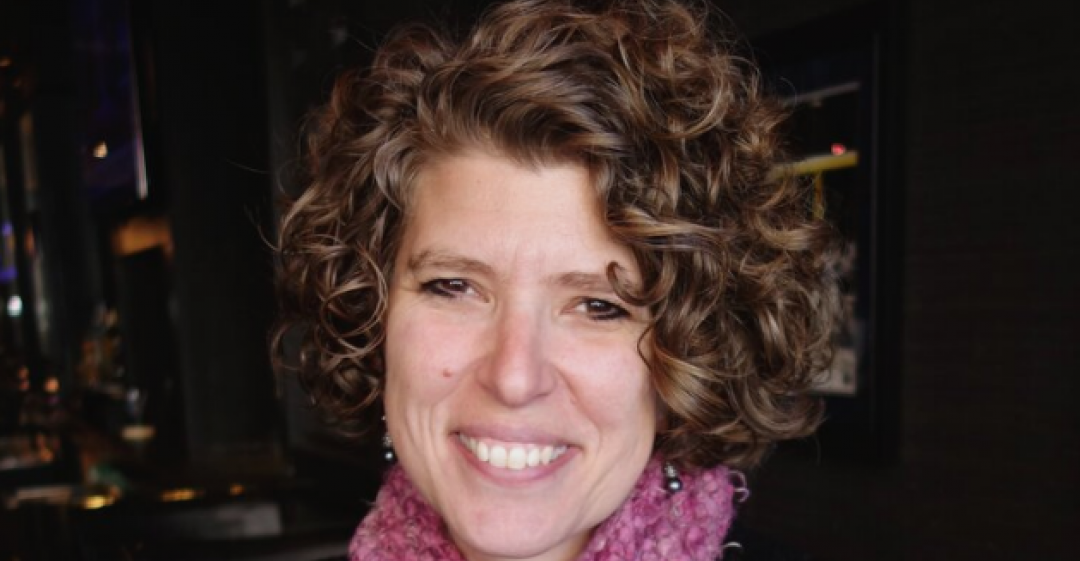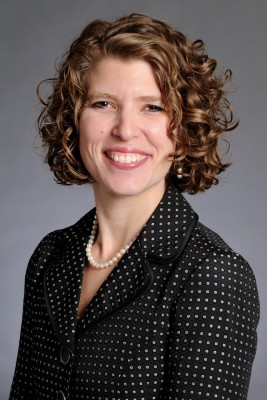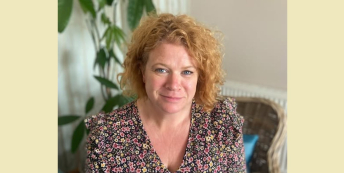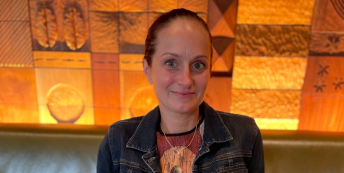“I was under immense stress.”

What work were you doing previously?
I spent my career working to level the playing field for health care consumers.
I started in public health research and consulting, where I fell in love with consumer insights. I made my way to a health plan for low and moderate income people, where I rose to Chief Marketing Officer. After almost a decade, I left to become CEO of a health care technology nonprofit, supporting community-based health care providers.
What are you doing now?
Good question! Some days I'm not sure how to answer that.
I took two years 'off' to be a Senior Fellow at the Harvard Kennedy School's Mossavar-Rahmani Center for Business and Government. I've conducted research into health care consumers' experiences and behaviours, investigating why shifting health care costs onto consumers has not turned the public into savvy health care shoppers.
I turned that research into a book about and for health care consumerism, or as I like to say, health care shopping.
Around the time I submitted my manuscript, I also started an Aspen Institute Health Innovators Fellowship, which entails starting a new venture among other things. I had been planning my book launch and the venture when COVID-19 came along. I'm still planning to launch a new venture, but in the context of the pandemic, I'm focused on writing, researching, and consulting about the immediate issues and longer-term implications.
How did you feel in your work before you decided to make the change?
I was under immense stress.
I'd taken the helm at a nonprofit that was losing money and needed a turnaround. The business conditions were so difficult, it felt almost like an impossible situation. That sense of responsibility to navigate such a difficult situation fueled me, but required so much from me that it left me depleted.
Why did you change?
When I realised the company would be stronger as part of a larger organisation, I orchestrated an acquisition process.
I took my severance payment and made my exit.
I was grateful for the clear impetus to make that needed change.
When was the moment you decided to make the change?
After the acquisition was complete and I'd already left, I entered an interview process for an executive job I think I would have loved at any other time in my life.
I met a friend and mentor for coffee while he was in town briefly. He said something like, “Before you take any job, just think about what you really want to do.”
When the recruiter called me after a final interview to tell me, “It's you. They want you,” I was thrilled, but also freaked out. “Oh no!” was definitely one of my first, unfiltered reactions. In that moment, I realised that as good an opportunity as it was, I wasn't ready to jump into the next role without taking some time to recharge.
How did you choose your new career?
The same friend who'd cautioned me not to jump too quickly to the next job had advised me to consider finding an 'academic playground' to give myself some time and space to figure out how to spend my next career chapter.
He'd even pointed me to the specific fellowship that I ultimately did. That suggestion and encouraging nudge put me on the path to a different kind of career.
Once in that programme, I had near complete freedom to pursue research questions that interested me. I dove into consumer research, which I love doing.
I heard so many compelling health care stories, and also so much consumer anxiety and confusion. I wanted to use my expertise to help consumers feel more competent and confident in making health care decisions. I decided to write a book as a resource for consumers.
Are you happy with the change?
Some days I regret leaving the comfort and purpose of the executive world.
But now that I've set myself free of that structure, I can't quite imagine going back to a role where I didn't have freedom to use my voice or chart my course.
I feel expansive possibilities in front of me; though overwhelming at times, I feel sure that I will never know what I can truly achieve without fully committing to this new career phase.
What do you miss and what don't you miss?
I definitely miss the structure and pay cheque of a day job.
I loved going to work every day and having a mountain of priorities to sort through and tackle.
In other ways, though, I don't always miss the routine, as I've gotten used to being flexible.
I also miss working on a team. I loved collaborating with my teammates, helping each other out, pushing each other, supporting each other. Of course, other people make work challenging, too, as you have to navigate the interpersonal dynamics. It can be easier to work solo, but I do miss the camaraderie and connection of colleagues working toward the same goals.
How did you go about making the shift?
One step at a time.
I really couldn't and still can't quite see a clear path from where I was to where I hope to go.
I went into each stage with a rough idea of what I hoped to do, and refined those ideas as I went through it. I'm still in that process and maybe will be for a long time if not forever.
What didn't go well? What wrong turns did you take?
Sometimes I wish I'd been more directed and more clear in my goals because I might have gotten further.
I didn't allow myself to really own my desire to write a book from the start, though I gently entertained the idea. I didn't commit to starting a venture at the end; I left it as “I'll see what happens.”
Similarly, I took on consulting projects early on, assuming that I could balance my research with some earning opportunities. I did balance it, but I wonder if I could have committed more fully to unpaid time if I could have spent more time readying myself for the next step.
That said, I try not to look back with too many regrets, recognising there was a reason for every decision I made along the way.
How did you handle your finances to make your shift possible?
I was lucky to start off with a severance cheque that could carry me into the first stage of my career shift.
That's probably the main factor that allowed me to back away from the executive job I'd explored. I looked at that financial cushion as permission to take a much bigger risk than I otherwise would have.
As I mentioned, I took on some consulting projects to make sure I continued to earn some money. But at some point, I realised that the effort I would have to put into building a pipeline of consulting projects would detract from my research and writing, and then my career hiatus would be wasted. I had to make a realistic time frame and then commit to investing in this transition.
I would have much preferred to save money than to spend it, but ultimately, I asked myself, “What are savings for if not for some level of career flexibility?”
What was the most difficult thing about changing?
One of the hardest things in my career change has been adjusting to a different pace of work.
Especially when I was Chief Marketing Officer for a health plan, I would arrive at my office with a full schedule of back-to-back meetings most days. I thrived on that pace. I loved switching gears between topics and projects, from working meetings to executive strategy sessions to managing personnel issues and staffing plans. I'd have a stack of things to review at all times, and usually someone hovering at the door for a quick question.
When I stepped off that path, suddenly I had no obligations or schedule, just my own internal goals. I told friends at the time that it was like running at a slower-than-natural pace. I'm not a fast runner at all, but I've learned that my body has its own pace, and if you ever try to run with someone a beat slower, it's actually uncomfortable. That's how my initial career shift felt.
Now I'm more used to moving at my own pace and pursuing my own goals, though it's still difficult to use expansive time efficiently and productively. It's also hard to focus on my own goals. I can't explain why it's still easier for me to help someone or do a task to meet someone else's goals. It should be the opposite, and I'm working towards putting my own ideas and priorities first.
Another challenging dynamic about shifting careers is to feel new all the time. At one point, I wondered to myself, why do I always feel incompetent? Why does everything feel difficult? And I realised it was because I had intentionally put myself in new situations.
It can be exhausting and sometimes demoralising to be constantly learning new things. But then I remember, I've done it to myself! I get bored doing the same things over and over. And this sense of climbing uphill is the cost of growing and hopefully resetting my career trajectory.
What help did you get? 
At the Harvard Kennedy School, I had access to graduate student research assistants who helped me with my research.
More importantly, they provided meaningful human connection.
Working with younger professionals with infinite career potential helped me to think big and aim high, since they were doing so and it seemed perfectly fitting to me that they would. These students, who were also contemplating transitions into the working world after school, were great sounding boards and moral supporters.
Then, when I became an Aspen Institute Health Innovators Fellow at the end of my Harvard appointment, I committed to starting a new venture. With that commitment came scaffolding and support for my exploration and my efforts. 'Having to' think about what work brings me joy and when have I felt most effective, and stepping through processes to plan and assess new venture opportunities, has been a great gift.
What resources would you recommend to others?
I recommend any practice that gets you closer to your real feelings or gives you insight into your values, motivations, and priorities.
For some people, that may be consulting a career coach or a therapist. For others, it may be scheduling a dozen informational interviews or coffees with friends or former colleagues to get ideas or advice.
I definitely think it helps to learn a bit about the world/s you're thinking of entering from people already working in those arenas. Getting insider insights can help you steer away from decisions you might regret later, or shorten your learning curve if you decide to go for it.
What have you learnt in the process?
I always had the sense (or a wish) that answers would reveal themselves to me – that I would suddenly know what to do next, get a great business idea, or somehow have an opportunity fall into my lap.
Nothing really happened like that. My phone didn't start ringing just because I got an appointment at the Harvard Kennedy School, and balloons did not fall from the ceiling when I finished my book, like at the end of some game show.
But when I declared my intentions, even before I felt completely ready to do so, I started to open more doors.
From that I learned to be willing to articulate a goal or an interest even before you have all your ducks in a row. Actually, one way to strengthen your ideas and plans is to share them before you feel completely ready. That can be so difficult, as I never want to waste an opportunity to get feedback on an idea I know is only half-baked. Sometimes my nascent ideas or goals feel too fragile to share; there's a stage where I get a glimmer of inspiration, and I'm not always ready to have it shot down.
These are lessons for me in building self-confidence and adopting a learning mentality.
What would you advise others to do in the same situation?
First, make a realistic financial plan.
How much do you need? Can you live on less? Do you have some sort of cushion that allows yourself time to experiment and learn? Understand how long you have to make this transition, and make sure that gives you a realistic runway. It'd be a shame to set off on a brave new course only to have to cut it short because you run out of money.
Next, be honest with yourself about your goals and motivations. Why are you looking to shift and what do you want to get out of it? It's likely to be harder to switch than to stay the course, so make sure the investment of energy, time, and money is worthwhile. Know why you're doing it and remind yourself of that intention along the way so you can stay true to it.
Finally, if you're not sure what to do but you know you need a change, be patient. Set yourself up to try new things and then listen to how you feel in those scenarios. Your work should fuel your energy, not sap it. You should feel excited, proud, motivated, engaged, and fulfilled.
Beyond that, there are no other “shoulds”. There's no point in beating yourself up about how you should be happy or feel satisfied if you're not. Letting go of those constraints will free you to find the best work for you.
To find out more about Deborah's work, visit www.debgordon.com.
What lessons could you take from Deborah's story to use in your own career change? Let us know in the comments below.



